Crazy Rich Asians
 for some suggestive content and language.
for some suggestive content and language.
Reviewed by: Samiatu Dosunmu
CONTRIBUTOR
| Moral Rating: | Very Offensive |
| Moviemaking Quality: |
|
| Primary Audience: | Young-Adults Adults |
| Genre: | Comedy Adaptation |
| Length: | 2 hr. |
| Year of Release: | 2018 |
| USA Release: |
August 15, 2018 (wide—3,384 theaters) DVD: November 20, 2018 |
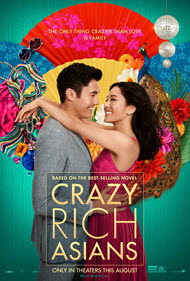

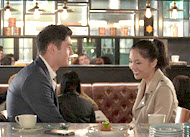
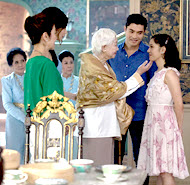
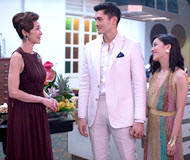
boyfriend girlfriend relationships
What is true love—a feeling, an emotion, or an action?
What does true love look like in a relationship? How do you know when you have found it?
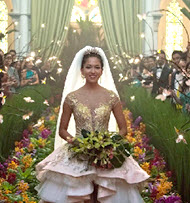
Marriage proposals
What does the Bible say about marriage?
Weddings
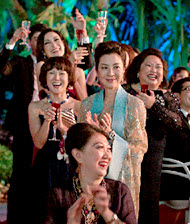
domineering mothers
eccentric families
wealth / riches
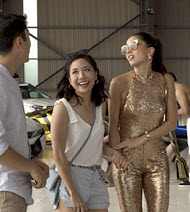
What does the Bible reveal about adultery?
What is fornication (sexual immorality)?
Sexual lust outside of marriage—Why does God strongly warn us about it?
Is there a way to overcome illicit and excessive lust for sex?
Purity—Should I save sex for marriage?
What about Gays needs to change? —It may not be what you think.
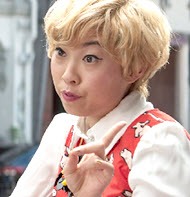
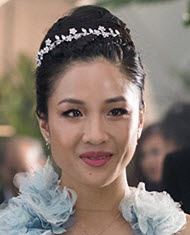
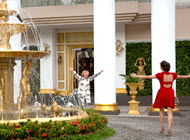
| Featuring |
|---|
|
Henry Golding … Nick Young—Rachel’s longtime boyfriend and Phillip and Eleanor’s son Constance Wu … Rachel Chu—Nick’s longtime girlfriend and Kerry’s daughter Michelle Yeoh … Eleanor Young Gemma Chan … Astrid Leong-Teo—Nick's cousin, Charlie’s ex-fiancée and Michael’s wife Jing Lusi … Amanda Ling Awkwafina … Goh Peik Lin Ken Jeong … Goh Wye Mun See all » |
| Director |
| Jon M. Chu — “Now You See Me: The Second Act” (2016), “Jem and the Holograms” (2015), “G.I. Joe: Retaliation” (2013) |
| Producer |
|
Color Force SK Global Warner Bros. See all » |
| Distributor |
Crazy Rich Asians is a film based on the bestselling novel by Kevin Kwan of the same name. An ode to the Chinese Singaporean elite of Southeast Asia, it is the tale of three families told against a backdrop of wealth, glamour, excess, social status and climbing. The film contains satirical elements to emphasize the meaning of “Crazy Rich,” while exploring the resulting behaviors of such status: deceit and intersectionality.
Viewers are first introduced to the primary family, the Youngs, in 1995, as they enter the prestigious Calthorpe, a private hotel in London. Eleanor Young (Michelle Yeoh), the matriarch is immediately scoffed by the concierge who advises her that he has no reservation under her name and that perhaps “she can explore a motel in Chinatown.” Lord Calthorpe, owner of the hotel, steps out of an elevator, and apologizes profusely to Mrs. Young. He informs the hotel staff that he and his family are no longer owners, having sold the property to the Young family.
The film fast-forwards to New York, 2018, Rachel Chu (Constance Wu), an economics professor, and Nicholas Young, also a professor, share coffee and desert at a café. During the conversation, Nicholas proposes to take an adventure east for spring break. He further explains that he is the best man to his childhood friend Colin Khoo (Chris Pang) who is getting married in Singapore to Araminta Lee (Sonoya Mizuno). Rachel is reluctant, at first, but is convinced after Nick mentions it would be a good opportunity to see her long-time college friend Goh Peik Lin (Awkwafina).
As they are discussing their plans, Nicholas is photographed in the restaurant. Within minutes, this picture travels around the world through social media and text. By the time the news reaches Eleanor, in Singapore, Rachel’s identity is revealed. She calls Nick to confront him and discovers that the rumors are true.
While shopping with her mother, Kerry Chu (Tan Kheng Hua) warns Rachel about the potential stigmas she will face. Even though she is Chinese, Chinese Singaporeans will view her as a foreigner, because she was born and raised in America. Rachel responds “I am so Chinese; I grew up to be an economics professor with a lactose intolerance.”
The following day, Rachel is shocked to learn that Nick has made first class accommodations which include a private suite. Overwhelmed by the grandeur of their flight accommodations, Rachel begins to question Nick’s family background. She outright asks him if he is rich, to which he replies that his family is comfortable; however, he has never viewed their fortune as his own. During the flight, he begins to reveal that his family makes their fortune through real-estate and investments. Upon arrival, at the Singapore airport, they are greeted by Colin and Araminta who take them a fun tour of the city on their first night.
Spiritual Issues
DECEIT — All of humanity is created in God’s image. However, we are separated from Him because of sin. From birth, we are drawn towards acting sinfully. An example of this is the difference between reasoning and rationalizing. Reasoning allows us to think things through in a logical and thoughtful manner. It requires us to act for the greater good and not out of selfishness. Psalms 86:5 is reflective of such: “For you, O Lord, are good and forgiving, abounding in steadfast love to all who call upon you.” Since the film shifts back and forth between families, two examples of reasoning versus rationalization are evident:
Initially, Nick reasons that he is protecting Rachel by keeping the extent of his family’s wealth and social status from her. However, that logic quickly falls apart throughout the film. Peik Lin, Rachel’s wealthy college roommate, reveals to her that the Youngs come from “old money” having amassed a large amount of wealth prior to immigrating to Singapore during the 1800s. They are known as the largestinternational property developers; in short, they are Singaporean royalty. Because of their wealth and social status, the family is a tight-knit circle. If one wants to be even remotely associated with them or the extended family, they must come from a similar background.
Nick downplays the rigors of his family’s personality and socialization. Upon her first encounter with Nick’s mother, during Nick’s extravagant welcome home party, Eleanor ridicules Rachel’s mother’s status as a single parent and that the reason she left China which was to pursue her passion. Ms. Chu has encouraged her daughter to do the same. Eleanor mocks this ideology, arguing that there is no such thing as pursuing one’s passion when family comes first; therefore, sacrifices need to be a priority.
In another example, Astrid (Gemma Chan), Nick’s first cousin, also discusses her marital status. According to family standards, her husband Micheal Teo (Pierre Png), is seen as a commoner, because he does not come from a wealthy family—her wealth emasculates him. This is evident when he makes comments such as, “We know you wear the money pants in this family,” or “I thought I saw the maid hide a pair of Jimmy Choo (designer shoes) behind the dryer”—a habit Astrid practices, so as to make her husband comfortable and accepted within the family.
Rationalizing is the justification of one’s actions, even though they are not logical or truthful. It is a state of denial. Jeremiah 2:35 states, “You say, ‘I am innocent; surely his anger has turned from me. Behold, I will bring you to judgment for saying, ‘I have not sinned’.” Throughout the film, one will see that Nick and Astrid’s reasoning is in fact rationalizing, as it creates more upset and chaos than peace and cordiality.
INTERSECTIONALITY — There is no doubt that the Youngs and their extended family faced discrimination because they were visible ethnic minorities while amassing their fortune and establishing their social status. As such, they practice intersectionality as a way to maintain distinction and respect. Intersectionality is a term used to describe how different forms of discrimination can interact and overlap with each other. Such practices are evident throughout the film.
In the beginning of the movie, Eleanor’s close friends offer to hire a private investigator to do a background check to determine Rachel’s wealth and social status. Peik Lin criticizes Rachel’s red dress that she chose to wear to meet Nick’s family for the first time, describing it as “Sebastian the Crab”—a “Little Mermaid” reference. She then dresses her up in a more revealing dress to show that she can be classy and stylish.
Throughout her stay, she is constantly reminded that she is a Chinese-born American and therefore can never measure up to the family’s social status. This is made evident when women from Araminta’s bachelorette party conspire together and leave a gutted dead fish on her bed with the words, “Catch this, you goldigging b*tch.”
During her introduction to Nick’s extended friends and family, her faux-pas are the subject of ridicule, particularly when she mistakes Nick’s nanny for his Ah Ma (grandmother). Eleanor also makes it clear that she will never be good enough for her son, since Rachel chose to pursue an education—assuming that she will never give up her career to become the dutiful wife she feels Nicholas needs.
The examples of intersectionality are not limited to outsiders. Even within the Young and extended family, there is a pecking order present. When Rachel is introduced to Oliver T’Sien (Nico Santos), Nick’s second cousin, he presents himself as one of the lesser wealthy family members, reduced to being aunt Eleanor’s henchman and fetch boy of some sort.
Given all these examples, is intersectionality biblical? No, it is not. While the term is not written in the Bible, the concept of overlapping types of discrimination was present in ancient times. John 4:1-45 describes an example: the woman at the well. She was a Samaritan and a woman, and considered a social outcast because of her ethnicity and lifestyle (having lived with five different men). When Jesus asked her for water, she was shocked that he was addressing her.
“The Samaritan woman said to him, “How is it that you, a Jew, ask for a drink from me, a woman of Samaria?” —John 4:9
The issue at the heart of intersectionality is not the number of ways Rachel or other family members were discriminated against, but rather the fact that such acts are evidence of a sinful heart. All sin separates us from God, and thus must be accounted for. Therefore, the cross is crucial to repentance. Further in John 4, when Jesus is speaking to the Samaritan woman, he states “…Everyone who drinks of this water will be thirsty again, but whoever drinks of the water that I will give him shall never thirst; but the water that I will give him will become in him a well of water springing up to eternal life.” (John 4:13-14)
Content of concern
Viewers should be aware that the film uses a combination of offensive language and witty remarks. While Rachel is getting a massage, she says, “Oh, I think this masseuse just made me pregnant.” During the bachelorette getaway, a gutted dead fish is left on Rachel’s bed with the words, “Catch this, you gold-digging b*tch.” When Peik Lin is invited to Nick’s welcome home party, she pulls out a cocktail dress from her trunk and says, “I am not an animal.” During Colin’s bachelor party, Eddie (Ronny Chieng), Nick’s first cousin, berates Rachel to Nick by telling him that her breast size is all she has to offer as her social status. Eleanor outright tells Rachel that she is not their kind. During a dress fitting, a remark is made that Rachel looks like “a slutty” Ebola virus.” During the bachelor party, someone remarks, “Make sure she does not take your balls.”
Nudity: Rachel’s party and wedding dresses are bareback, low waist with mild fabric covering her chest area to make it appear, she is not wearing a bra. Both Micheal and Nick are seen topless in pajama pants. Rachel cuddles with Nick in bed wearing a tank top and obviously no bra. During the bachelor party, many women are seen dancing provocatively in bikinis, while men are seen with their shirts unbuttoned. A guest is seen dancing sexually during the wedding.
The films strength is its production quality and set design. It is very colorful to the point that it sometimes distracts from the story line. However, that is the point to emphasize—the term “Crazy Rich.”
- Violence: Minor
- Profane language: Heavy— • “Oh J*sus” (1) • “G*d-d*mn” (2) • “Oh my G*d” (4) • “Oh God” (1)—plus OMG and OMFG acronyms are shown • “H*ll” (4) • “d*mn” (3)
- Vulgar/Crude language: Heavy— • f-words (1 or 2) • bullsh*t (2) • s-words (1) • cr*p • “You dog turd” • a**hole (3) • a** (3) • t*ts • b*tch (4) • b*stard • “She's a hottie” • skanks • slutty • raunchy • slang word for male genitals (used repeatedly) • “b*lls” • “human douche nozzle” • bloody
- Nudity: Moderately Heavy
- Sex: • Unmarried couple kissing, including in bed (clothed) with sex suggested • Sexual comments, innuendoes and situations, and reference to fornication and homosexuality • Man’s hand on woman’s breast (clothed) • Fully nude statues of women
- Occult: Superstitious beliefs
See list of Relevant Issues—questions-and-answers.


I have since completed all of the “Rich” series (China Rich Girlfriend and Rich People Problems), so I was already very acquainted with the vibrant cast of characters.
Currently, this movie is doing extraordinarily well at the box-office, which is a testament to the fact that people ARE interested in stories featuring Asians. Hollywood has long had a problem with white-washing, and it was great to see an all Asian cast in a blockbuster-type film. I really hope they continue on with the other two book-to-movie adaptations, as the plot only becomes more entertaining.See all »
Moral rating: Average / Moviemaking quality: 5
The issue I have is with the review IMPROPERLY defining intersectionality, as if it is negative. Intersectionality refers to overlapping social categorizations as they apply to a person, showing that no one is defined by one “box.” The concept is that we should take the time to better acknowledge and understand ALL of a person’s categorizations that make them unique as part of making them feel included. For example, I am an African-American, a woman, a sister, a daughter, a Christian, college-educated, middle class, and from the South. ALL of those things are part of who I am, so to make assumptions about me or place expectations on me by only considering one (or even two) of those boxes, would make you very wrong, and create conflict.See all »
Moral rating: Average / Moviemaking quality: 5
Moral rating: Offensive / Moviemaking quality: 4½
PLEASE share your observations and insights to be posted here.


My Ratings: Moral rating: Better than Average / Moviemaking quality: 4